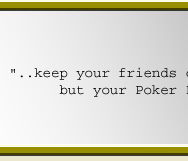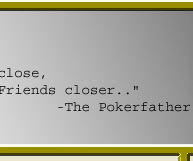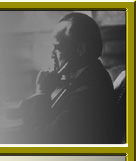Copyright 2010 Full
Tilt Poker
June 1st, 2010
(View all Online
Poker Lessons)
Poker Lesson: Fold Equity
Author: Andy Bloch
During the final table of Event #1 at the 2008 WSOP, the $10K Pot-Limit Hold ‘em Championship, I encountered a hand where I had a very tough decision to make. We were about midway through the final table with the blinds at $20K/$40K. I had about $2.2 million in chips when I picked up pocket 10s in middle position. I raised the pot to $110K and was called from one of the blinds by Mike Sexton, who had about $100K less in chips than I did.
The flop came 8-6-2 rainbow, Mike checked and I bet $125K with my over-pair and gut-shot straight-draw. He called, and the turn brought a 7. After thinking for a moment, Mike bet out $365K, and I was left with a very difficult choice. He could have me beat with a bigger over-pair like pocket Jacks or two pair even, or he could just have a draw or something like pocket 9s. So what should I do in this situation? Do I just call now and be faced with another big decision on the river if he bets out again? Do I get away from the hand altogether and fold? The real question is this: if I raise, is there any chance he’ll fold his hand?
All of which brings me to the concept of fold equity. For our purposes, equity can be defined as your chance of winning the pot, or how much you expect to make out of the pot. Therefore, fold equity is the chance you could win the pot because your opponent will fold.
A classic example of fold equity is really any time you attempt a semi-bluff. Say you have a flush draw and one over-card on the flop. Your opponent might not call you without top pair or better, but there’s a good chance that you’re nothing more than a coin flip against almost anything he’s holding. In this case, moving all-in gives you fold equity because you know that your opponent is only going to call you part of the time. Semi-bluffs are so powerful because of fold equity.
You also have a lot of fold equity when you play aggressively pre-flop. Some novice players don't like to raise pre-flop with a hand that they won't call a re-raise with, but an expert player will be raising (and sometimes re-raising) with many hands that aren't a favorite to be best when re-raised. The fold equity can make these marginal hands profitable. Keep in mind, there will be situations where you should fold some of these same hands if there's little chance that you can steal the pot.
Fold equity is also an extremely important concept in tournament play, especially as you approach the bubble. A lot of players tend to play way too tight as they wait for the bubble to burst; many will just try to fold their way into the money. At this point, there may be enough fold equity to play any two cards because your opponents are going to fold such a high percentage of their hands. This concept also applies once you’re in the money (though to a lesser extent), and people are playing tight as they try to make their way up the money ladder to a bigger payday.
This brings us back to my hand against Mike Sexton at the final table of Event #1. Do I call, fold, or raise? Calling will most likely lead me to the same tough spot on the river if he bets out again, especially if an over-card hits. Folding doesn’t seem like the best option because there’s a good chance that I’m actually ahead in the hand (Mike could have a pair with a straight-draw), and even if I’m not ahead I have a decent number of outs and I’m getting better than 2-1 pot odds to make the call. I'm only in really bad shape if I'm up against a straight. If I'm against an over-pair or set, I have 6 outs. If I'm against two-pair, I have 12 outs. So because this is a tournament, because he probably doesn’t want to go broke in this spot, because it’s a very aggressive play with a good amount of fold equity, I decided to move all in. And it worked. After thinking about it for a long while, Mike decided to fold his hand.
Mike made it sound afterwards like he had my hand beat, and I found out later that he did indeed make two pair on the turn with his 7-6. I knew I couldn’t make that play if there was no chance he would fold. If that were the case, I probably would’ve just called or folded. But this bet had a lot of fold equity, so it was a move I just couldn’t pass up.
Fold equity is a very important concept in both ring games and tournaments, but especially in tournament situations like the one I just described. When you consider the fold equity you have in any given hand, you can really start to play some power poker.
Best Full Tilt Poker Bonus

Downloaded from
the World Wide Web on June 1st, 2010:
http://www.fulltiltpoker.com/pro-tip/AndyBloch/226 |








